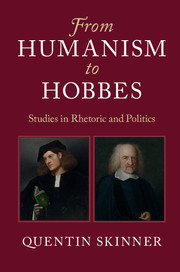Description
From Humanism to Hobbes
Studies in Rhetoric and Politics
Author: Skinner Quentin
Offers new insights into the works of Machiavelli, Shakespeare and especially Hobbes by focusing on their use of rhetoric.
Language: English
Subject for From Humanism to Hobbes:
Approximative price 32.87 €
In Print (Delivery period: 14 days).
Add to cart
From Humanism to Hobbes
Publication date: 01-2018
444 p. · 15.4x22.8 cm · Paperback
Publication date: 01-2018
444 p. · 15.4x22.8 cm · Paperback
Approximative price 107.81 €
In Print (Delivery period: 14 days).
Add to cart
From Humanism to Hobbes
Publication date: 01-2018
Support: Print on demand
Publication date: 01-2018
Support: Print on demand
Description
/li>Contents
/li>Biography
/li>
The aim of this collection is to illustrate the pervasive influence of humanist rhetoric on early-modern literature and philosophy. The first half of the book focuses on the classical rules of judicial rhetoric. One chapter considers the place of these rules in Shakespeare's The Merchant of Venice, while two others concentrate on the technique of rhetorical redescription, pointing to its use in Machiavelli's The Prince as well as in several of Shakespeare's plays, notably Coriolanus. The second half of the book examines the humanist background to the philosophy of Thomas Hobbes. A major new essay discusses his typically humanist preoccupation with the visual presentation of his political ideas, while other chapters explore the rhetorical sources of his theory of persons and personation, thereby offering new insights into his views about citizenship, political representation, rights and obligations and the concept of the state.
List of illustrations; Acknowledgments; List of abbreviations and conventions; 1. Introduction; 2. Classical rhetoric and the personation of the state; 3. Machiavelli on misunderstanding princely virtù; 4. Judicial rhetoric in The Merchant of Venice; 5. Rhetorical redescription and its uses in Shakespeare; 6. The generation of John Milton at Cambridge; 7. Rethinking liberty in the English revolution; 8. Hobbes on civil conversation; 9. Hobbes on political representation; 10. Hobbes and the humanist frontispiece; 11. Hobbes on hereditary right; 12. Hobbes and the concept of the state; Bibliographies; Manuscript sources; Primary printed sources; Secondary sources; Index.
Quentin Skinner is Professor of the Humanities at Queen Mary University of London. He is a Fellow of the British Academy and the Academia Europaea, and a foreign member of the American Academy, the Academia Nazionale dei Lincei and many other learned societies. He has been awarded honorary degrees by numerous major Universities, including the University of Chicago, Harvard University and the University of Oxford. His scholarship, which is available in more than two dozen languages, has won him many awards, including the Wolfson Prize for History and a Balzan Prize. His two-volume study, The Foundations of Modern Political Thought (Cambridge, 1978), was listed by The Times Literary Supplement in 1996 as one of the hundred most influential books since World War II. His other books include Reason and Rhetoric in the Philosophy of Hobbes (Cambridge, 1996), Liberty Before Liberalism (Cambridge, 1998), Machiavelli (2000), Hobbes and Republican Liberty (Cambridge, 2008), Forensic Shakespeare (2014) and a three-volume collection of essays, Visions of Politics (Cambridge, 2002).
© 2024 LAVOISIER S.A.S.




